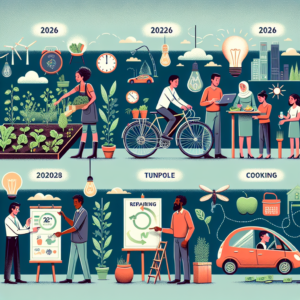The Rise of AI in Personal Finance: Tools to Watch in 2025

The Rise of AI in Personal Finance: Tools to Watch in 2025
Artificial Intelligence (AI) is no longer the stuff of science fiction—it’s a real-world force that’s rapidly transforming how we manage our money. As we step into 2025, the marriage between AI and personal finance is bringing powerful innovations that promise to make budgeting, investing, and financial planning more accessible, tailored, and efficient than ever before.
Why AI is Revolutionizing Personal Finance
Personal finance has traditionally involved a lot of manual work: spreadsheet tracking, reviewing statements, researching investment opportunities, and strategizing for the future. With AI, many of these processes can be automated or enhanced, leading to:
- Personalized insights: AI analyzes your spending patterns and offers tailored recommendations.
- Fraud detection: Machine learning models flag suspicious transactions in real time.
- Smart investing: AI-driven robo-advisors custom-build portfolios based on your goals and risk tolerance.
- Automated savings: Intelligent algorithms help find “extra” money to save or invest.
Let’s look at the most promising AI-powered tools evolving—and emerging—in 2025 that are reshaping personal finance.
Top AI Personal Finance Tools to Watch in 2025
1. Next-Generation Robo-Advisors
The robo-advisor market is getting an AI upgrade. While early versions focused on low-cost, rules-based investing, 2025’s robo-advisors are using more advanced algorithms and real-time data feeds. They provide hyper-personalized portfolios, taking into account life changes, global economic shifts, and even behavioral cues—like how you react to market dips. Companies like Wealthfront, Betterment, and up-and-comers with generative AI features will drive this space forward, offering services that rival traditional human advisors at a fraction of the cost.
2. AI-Enhanced Budgeting Apps
Budgeting apps are shifting from static trackers to proactive financial assistants. Tools such as Copilot Money and You Need a Budget (YNAB) are beginning to integrate AI to analyze your transactions, forecast bills, and offer real-time advice—like alerting you to upcoming expenses or warning about overspending trends. Expect new entrants in 2025 to utilize natural language processing so you can “talk” to your assistant, asking questions like “How much can I spend on dining out this month?” and getting nuanced, personalized answers.
3. Automated Financial Planning
In 2025, AI-powered planning tools are stepping in where traditional financial planners leave off. Advanced platforms are aggregating income, expenses, investments, debts, and even user aspirations to map out dynamic, long-term plans. Tools such as Albert or the latest innovations from fintech startups allow users to simulate life’s “what if” scenarios—career changes, home purchases, having kids—and instantly see the impact on their financial roadmap.
4. Intelligent Credit Management
AI tools like Cleo and Upstart now help users not just monitor but actively manage their credit health. By scanning your credit usage, payment patterns, and financial opportunities, these platforms can recommend ways to boost your credit score, refinance expensive debt, or alert you to better offers. In 2025, expect these services to become more predictive—not only flagging risks but also preemptively suggesting moves to maximize your credit profile.
5. Personalized Financial Education and Coaching
One of AI’s most exciting promises is democratizing financial literacy. New educational platforms—powered by AI chatbots and simulations—can deliver lessons tailored to your knowledge level, financial goals, and even your learning style. Apps are emerging that not only answer your money questions on demand but proactively teach you what you need to know at the right moment (e.g., before taking out a loan or making a big purchase).
Key Benefits—and Cautions—of AI in Personal Finance
With all this innovation, the advantages are clear:
- Time savings: Automation reduces manual tracking and research.
- Accuracy: AI reduces errors and missed opportunities.
- Personalization: Your financial life gets custom-fit solutions.
- Democratization: High-powered advice becomes affordable to all, not just the wealthy.
However, adopting AI for your finances isn’t without challenges:
- Security: Relying on digital tools means being vigilant about data privacy and cyber threats.
- Complexity: AI models can be opaque—it can be hard to understand why a tool recommends a certain move.
- Over-reliance: Technology can help, but shouldn’t replace basic financial literacy and judgment.
How to Make the Most of AI Tools in 2025
Ready to let AI power up your personal finances? Here’s how to get started:
- Explore reputable tools: Research new apps, read reviews, and choose platforms with robust security and customer support.
- Integrate but verify: Let AI recommendations guide you—but always double-check major decisions.
- Educate yourself: Use AI-powered education tools to deepen your financial knowledge.
- Stay informed: Keep up with emerging technologies—today’s “wow” feature quickly becomes tomorrow’s standard.
The Future of Financial Empowerment
The rise of AI in personal finance is more than a trend—it’s a new era of empowerment. As 2025 unfolds, expect smarter, more seamless, and deeply personalized tools that help you save, invest, and plan with greater confidence. By embracing these advancements, you can navigate your financial journey with clarity and peace of mind.
Are you ready to let AI help you get your money right?
* The post is written by AI and may contain inaccuracies.





